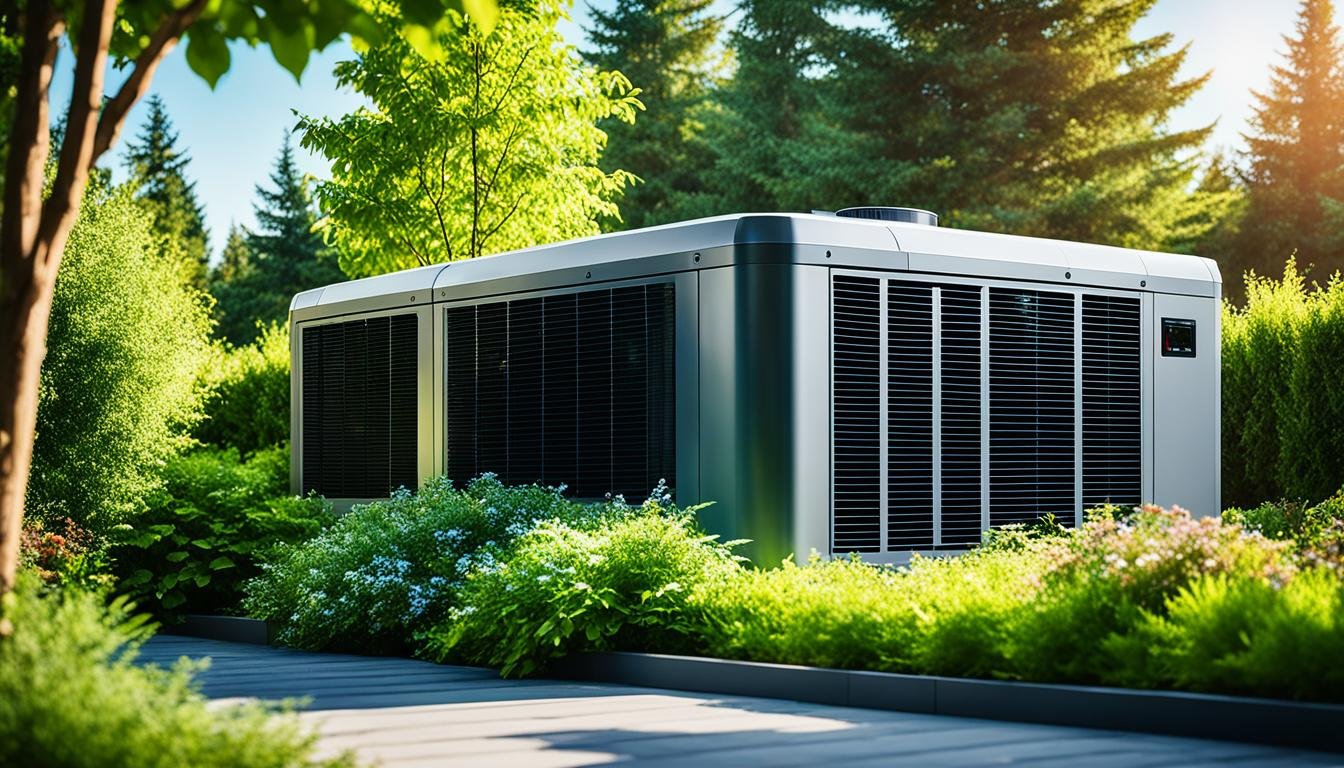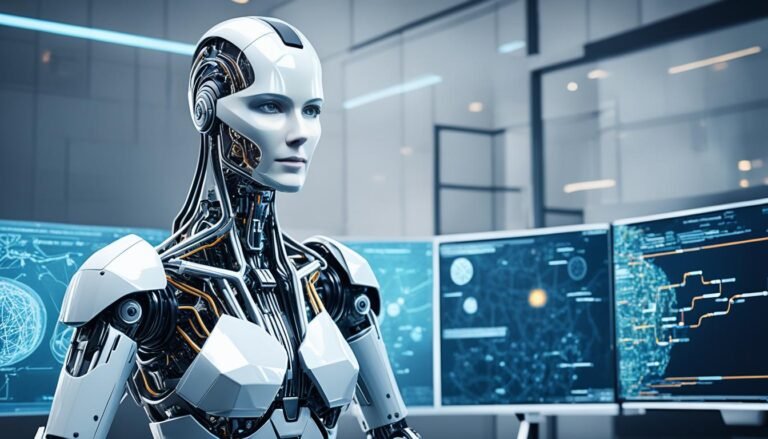Heat Pumps: Innovations in energy-efficient heating and cooling solutions.
Heating and cooling use a lot of energy worldwide and produce a lot of carbon dioxide. We need to change this to reduce emissions. That’s why efficient heat pumps are being developed.
These devices move heat from one place to another using electricity. They make buildings more efficient for heating and cooling. Heat pumps can get heat from outside air, water, or industrial processes. They give three to six units of useful heat for every unit of electricity used.
They can work with gas-fired boilers in old buildings, keeping them warm even in the cold. Heat pumps can also help the energy grid, making them key for a green energy future.
Key Takeaways:
- Highly efficient electricity-driven heat pumps offer energy-efficient heating and cooling solutions for buildings.
- Heat pumps extract heat from various sources and provide three to six units of useful thermal energy for each unit of electricity consumed.
- Heat pumps can be combined with gas-fired boilers for enhanced efficiency in colder weather.
- They can also be aggregated to provide services to the grid, contributing to a sustainable energy system.
Innovations in Heat Pump Technology
Heat pump technology has seen big changes in recent years. These changes have made them a top choice for heating and cooling in homes and businesses.
Two-Speed Compressors: A big step forward is the two-speed compressors. They let heat pumps change capacity to meet heating or cooling needs. This means they use less energy and last longer by running slower when it’s not too hot or cold.
Variable-Speed Motors: Variable-speed motors are another big deal. They adjust fan speeds for better airflow and use less energy. This matches the heating or cooling needs, making the system more efficient.
Desuperheater: Desuperheaters are great for heating water efficiently. They take waste heat from cooling mode and use it for water heating. This cuts down on energy costs a lot.
Scroll Compressor: Scroll compressors are more efficient and reliable than old piston ones. They send out warmer air during heating, keeping places cozy in the cold.
Dual-Fuel Systems: Dual-fuel systems are perfect for really cold places. They mix a heat pump with a gas furnace for heating when it’s freezing. The heat pump is the main heater, and the gas furnace helps when needed.
Cold Climate Heat Pumps: For very cold areas, special heat pumps are being made. These pumps work well even in freezing temperatures, making sure you stay warm all year.
Thanks to ongoing improvements, heat pumps are now more efficient and versatile. They’re becoming the best choice for saving energy and keeping places comfortable.
The Benefits of Heat Pumps
Heat pumps are great for both homes and businesses. They provide heating and cooling efficiently. Let’s look at the main advantages:
1. Efficiency and Energy Savings
Heat pumps are very efficient. They move heat from one place to another, not burning fossil fuels. This means they use less energy, cut down on bills, and reduce carbon emissions. Choosing a heat pump helps make your home or business more eco-friendly.
2. Consistent Comfort
Heat pumps work well all year, keeping you comfortable. They can heat and cool, so you don’t need separate systems. This makes them easy to install and maintain. Heat pumps keep your space perfect, whether it’s hot or cold outside.
3. Versatility
Heat pumps can be used in many ways. They work for single rooms or big buildings. They can work with your current HVAC or as a standalone unit. This makes them perfect for new buildings or updating old ones.
4. Environmental Sustainability
Heat pumps use renewable energy, which is good for the planet. They use less fossil fuel, so they have a smaller carbon footprint. By using a heat pump, you help fight climate change and protect the environment.
5. Grid Stability
Modern heat pumps help the power grid by using less energy when starting up and reducing demand. This prevents power outages and makes the energy supply more stable. Adding heat pumps to our energy systems makes it more efficient and sustainable.
Heat pumps are a smart choice for efficient, cozy, and green heating and cooling. They’re versatile and help keep the power grid stable. This makes them a top pick for today’s buildings and homes.
Adoption and Barriers to Heat Pump Installation
Heat pumps are not as widely used as traditional heating systems, despite their many benefits. Cost, contractor education, and the time needed for homeowners to learn about them are major hurdles. These issues slow down their adoption.
The high upfront cost of installing heat pumps is a big reason why they’re not more popular. Even though they save energy and money over time, the initial cost can be a barrier. Yet, considering the long-term savings and energy efficiency, heat pumps are a smart choice.
Contractors often don’t know enough about heat pumps. They’re usually more skilled in traditional systems. This lack of knowledge makes homeowners unsure about finding qualified installers. It also makes them hesitant to switch to heat pumps without the right support.
“The lack of education and training among contractors can slow down the adoption of heat pump technology. We need to invest in training programs and provide resources for contractors to become proficient in heat pump installation and maintenance.”
Homeowners also need to spend time learning about heat pumps. They must understand how they work, their benefits, and how to maintain them. This can be a big step for homeowners, making them less likely to adopt this new technology.
To increase heat pump use, we need a comprehensive plan. Training contractors about heat pumps can make them more available to homeowners. Offering financial incentives like tax credits or rebates can also help cover the cost of installation. This makes heat pumps a more appealing option.
By tackling these challenges, we can speed up the adoption of heat pumps. This will help reduce greenhouse gases, lower energy use, and support a sustainable future. Investing in education, training for contractors, and incentives is key to making heat pumps more accessible and affordable for homeowners.
The Importance of Market Share
Looking at market share is crucial when talking about heat pump adoption. Even though heat pumps are gaining ground, they’re still behind traditional systems. Market share shows us the industry’s growth, what consumers prefer, and the potential for more adoption.
Market share shows us how well heat pumps are doing and where they can grow. With more research and targeted efforts, we can increase adoption and grow the market for heat pumps.
By working on the barriers to heat pump use and using market share insights, we can move faster towards energy-efficient heating and cooling. This will help create a more sustainable future.
Heat Pump Technology and the Future
The future of heat pump technology looks bright for energy-saving heating and cooling. As we focus on being more sustainable and cutting down on carbon emissions, heat pumps will be key in changing how we heat and cool homes and businesses.
New innovations like inverter-driven variable capacity systems are leading the way. These systems adjust their power based on what’s needed, making them more efficient and comfortable. They change speed to match the situation, saving energy and working better.
Heat pumps are becoming a top choice as we move towards using more electricity. They use electricity to work, which means less greenhouse gases. Switching to heat pumps helps fight climate change and reach goals of being carbon neutral.
Heat pump technology is also getting smarter with better controls and connectivity. These features work with IoT platforms for easy control and monitoring from anywhere. Data and algorithms help make them work better, saving energy and cutting costs.
More people are learning about the benefits of heat pumps, so they’re being used more in homes and businesses. They can do more than just heat and cool; they can also heat water and even help in industrial processes.
Heat pumps do more than just help the environment. They make us less dependent on limited fossil fuels, which makes our energy supply more secure. They can work in many places and climates, making them very versatile.
Heat pump technology is set to change how we heat and cool our spaces. With new innovations, they’re leading the way to a sustainable and efficient future.
By using heat pumps, we can make our homes and offices more comfortable and lower our carbon footprint. Heat pumps are changing the game in how we use and save energy, in both homes and businesses.
Conclusion
Heat pumps are now a key part of making our heating and cooling systems sustainable. They save energy and are good for the planet for both homes and businesses. Thanks to their flexibility and ongoing improvements, they’re helping us move towards a greener future.
Using heat pump technology helps us save a lot of energy and cut down on carbon emissions. This makes our buildings more comfortable and eco-friendly. Heat pumps work well in all kinds of weather, making them a great choice for everyone.
Heat pumps take heat from the air, ground, or water to keep our spaces cozy. This means they use less energy and are key to using less fossil fuel and more renewable energy. As we look for ways to be more eco-friendly, heat pumps will be more important. They help us meet our energy needs and protect the planet for the future.







